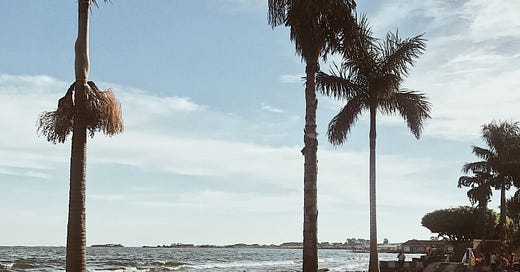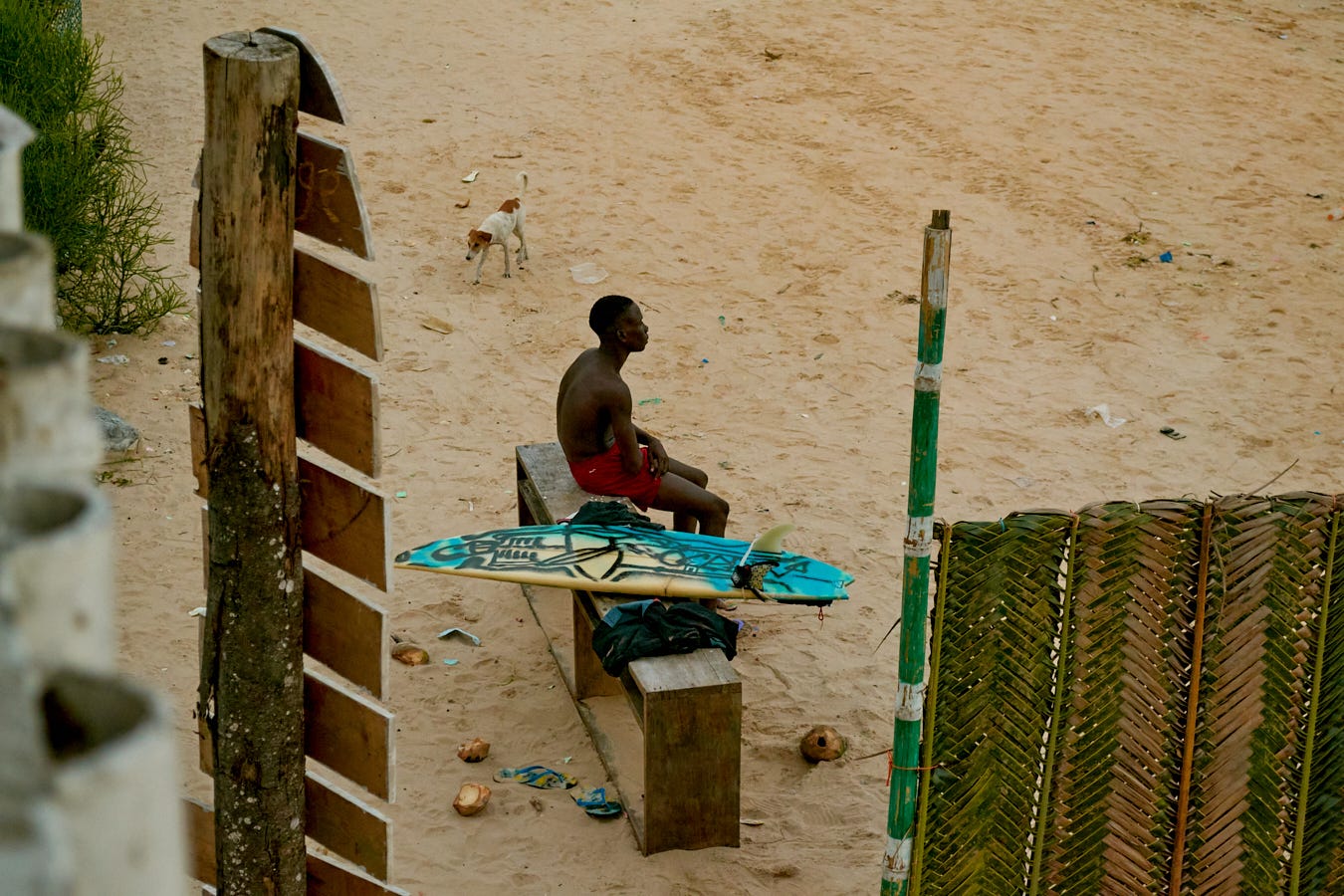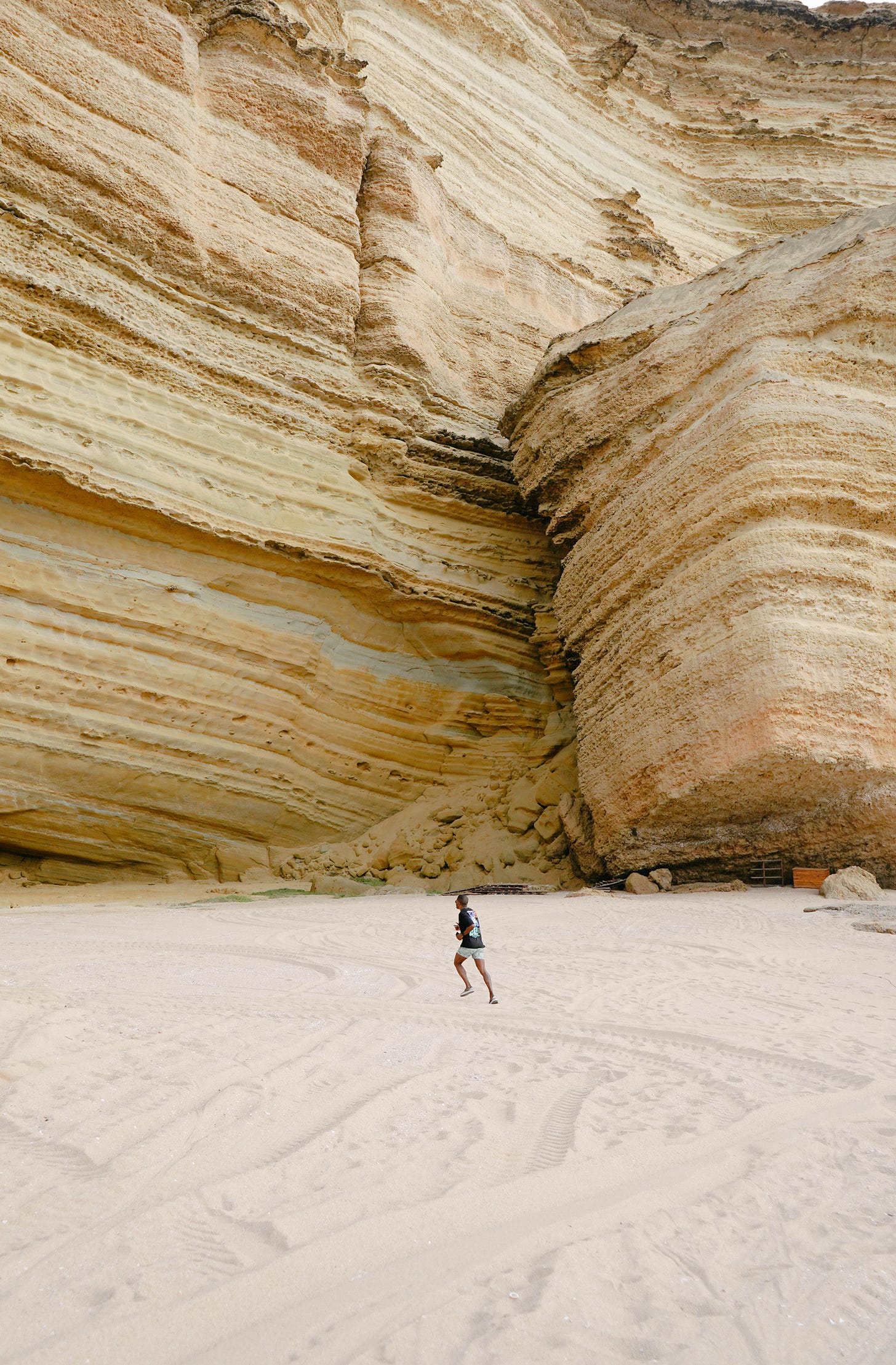This is the 162nd edition of Tender Photo, a digital platform of African photography.
Two figures sit on monobloc chairs which dot the beach at the right edge of the photograph. Two pairs of shoes, presumably theirs, nestle in the sand by their feet. A marabou stork leans forward into the sand, its wings outspread and beak partially open, in front of the first of three evenly spaced palms, which stand unusually close to the water. The composition of these elements create conflicts of depth and scale, shifts which are balanced by the water and the beach that spread out on a near-perpendicular plane to them. Along this line, by the two palms near the background, children emerge from the shadows; behind them, the outlines of another marabou stork and yet other individuals appear alongside a short flight of black-and-white stairs. Everything seems to be halfway in the light, and halfway outside it.
— Michelle Angwenyi
“Over time, my approach to understanding the weight of my influence in sharing photos has changed.”
The photo was taken at Entebbe-Lake Victoria. I was having lunch with friends, enjoying some of the best potatoes I've ever had. The beach had this uniquely beautiful vibe—Marabou storks by the shore were scaring some people while others remained in awe. I grew up by the Indian Ocean, and the birdlife there hardly compares in size. I thought the mix of everything going on was beautiful, and I see my photos as a dialogue with my future self. I didn't have time to compose a shot with my DSLR, so I just used my phone. It's a lovely surprise to be reminded of that time when I was super curious about the world and used to document everything. Now, I tend to overthink every photo I take.
I chose this photo because so much was happening, much like life. I really resonate with photos that capture the rhythm of daily life in a specific place and time. I also love that I took it with my phone—I appreciate how accessible photography has become. Now, anyone with a phone can join in on visual conversations.
My approach to photography is starting starts with curiosity. If something catches my attention, maybe it’s the energy it conveys or the vibe of the surroundings, I respond and capture it. Over time, my approach to understanding the politics of power dynamics and the weight of my influence in sharing photos has changed. I tend to ask questions and converse before taking a shot, getting to know my surroundings or the people I'm photographing so I don’t rob myself of the chance to understand what a situation is asking of me—whether it's to show empathy or simply enjoy a moment. Photos have, and always will be, impactful because they bear witness; they capture a moment and invite us to engage with it. What we do with that captured moment is something I still struggle with. I used to believe art could change the world and make people better—maybe I still do, though with the current rise in fascism, I find that hope harder to hold onto. Perhaps the constant flood of images has made us numb.
— Neema Ngelime
About Nemma Ngelime
Neema is a documentary photographer and filmmaker who captures everyday beauty through feminist, experimental lenses. She is a DocNomads alumna and Berlinale Talents 2023 member, part of the African Photojournalism Database (World Press Photo/Everyday Africa) and African Women In Photography. Her photos have been commissioned by Bloomberg and NYT, her work exhibited at Serbia’s Museum of African Art, and local spaces like Nafasi Art Space. Currently, her work is being shown at Warsaw’s National Ethnographic Museum in Poland. You can find more of her work on Instagram, and on her website.
RELATED — “Man, Dog, Surfboard” by Danielle Almona
This photograph was taken in Tarkwa Bay, located on the shoreline of Lagos, Nigeria. I was born in Lagos and lived there for about 19 years but had never been outside the city. I moved back to Lagos earlier this year and made it my mission to explore and put myself out there now that I was older and could move around with a bit more freedom. Someone reached out to me to film a short documentary on the beach and we would camp out there for two nights. It was an adventure I couldn’t turn down. An easy yes. A 30-minute drive and boat ride later, we were outside the city and on this island where time lost meaning and the air felt fresher and lighter.
LAST WEEK — “Patterns Of Nature” by Marta Camarada
This photo was taken in Praia do Soba, in Namibe, Angola’s southernmost province. There wasn’t much of a process, just awe. I happened to be in awe at finally seeing a place I had only ever heard about, never properly pictured, and realising no photo could truly do it justice.
Read more.
TENDER PHOTO is a digital platform of African photography, founded by Emmanuel Iduma. This edition is edited by Michelle Angwenyi, one of our editorial fellows. Our newsletter aims to engage with life on the African continent through photography. We publish narratives about the people, places, and events pictured in photographs, contributing to nuanced and layered perceptions. The newsletter also read on web (best for viewing images), and via the Substack iOS/Android apps.
Every Wednesday we feature a photograph, a short caption about it, and a statement from the photographer. In the past, we have published commentaries or photo-essays in response to photographs previously featured on the newsletter, including CORRESPONDENCES, CONCORDANCE, KINDRED, INDEX, and AFFINITIES.
Thank you for reading. If this newsletter was shared with you, consider subscribing, or forward to a friend. Please whitelist the newsletter to ensure you never miss it.








